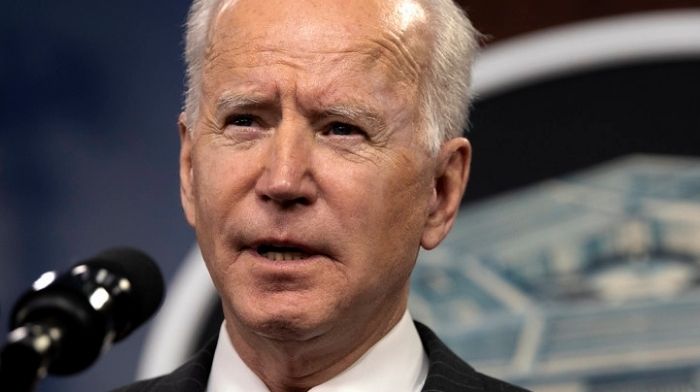
By Casey Harper (The Center Square)
President Joe Biden is taking fire for comments he made about his $3.5 trillion legislation just as the bill faces a deeply split Congress.
Biden made headlines for claiming the bill would cost “zero dollars,” despite media reports and members of both parties commonly naming the bill’s cost at $3.5 trillion for the last several months.
“My Build Back Better Agenda costs zero dollars,” Biden wrote on Twitter. “Instead of wasting money on tax breaks, loopholes, and tax evasion for big corporations and the wealthy, we can make a once-in-a-generation investment in working America. And it adds zero dollars to the national debt.”
RELATED: Arizona Democratic Party Goes After Sen. Kyrsten Sinema For Opposing Massive Spending Bills
The administration argues tax increases will offset the bill’s expenses, something that is very much in flux given Democrats’ hesitancy about parts of the bill, and the taxes to pay for it.
Even still, critics took issue with the claim of a zero cost, even if Biden does manage to include enough tax increases to fund the legislation.
“The $3.5 trillion in spending and tax credits combined with at least $2 trillion in tax hikes will add to the debt and have a tremendous cost to the economy and to the health of American families,” David Ditch, a budget expert at the Heritage Foundation, said.
“The taxes will hit families taking home as little as $30,000 per year, violating President Biden’s promise, reduce private sector investments that create jobs and opportunities for workers, and put America at a disadvantage with our global competitors. Huge increases in welfare spending will discourage work and make families increasingly dependent on government, which is exactly the wrong approach to increasing wealth for low-income households.”
“The bottom line is that the costs are real and deserve more attention from the media,” he added.
Earlier this month, Democrats proposed raising the top tax rates for individuals to 39.6% from 37%, and for corporations to 26.5% from 21%.
Some have estimated the package will exceed $3.5 trillion costs. The Committee for a Responsible Federal Budget estimated the bill could cost $5.5 trillion over 10 years.
“All government spending consumes resources taken from the private sector and thus would generally shrink private GDP,” said Chris Edwards, an economic expert at the Cato Institute.
“Contrary to Biden, $3.5 trillion more government spending would likely cost the private economy not just $3.5 trillion but probably more than that. That’s because extracting every additional $1 of taxes causes about $1.50 of damage or ‘deadweight losses’ to the private economy. When taxes rise, individuals and businesses reduce their productive activities and private output falls.”
The overall price tag has been a key sticking point for Democratic Sens. Joe Manchin and Kyrsten Sinema, both of whom have explicitly said they cannot vote for the measure because of it’s $3.5 trillion cost. A less expensive plan may be able to get their vote, they said.
RELATED: Democrats’ Massive Spending Bill Would Hasten America’s Fundamental Transformation
“These are not indications of an economy that requires trillions in additional spending,” Manchin said. “Every elected leader is chosen to make difficult decisions. Adding trillions of dollars more to nearly $29 trillion of national debt, without any consideration of the negative effects on our children and grandchildren, is one of those decisions that has become far too easy in Washington. Given the current state of the economic recovery, it is simply irresponsible to continue spending at levels more suited to respond to a Great Depression or Great Recession – not an economy that is on the verge of overheating.”
Biden’s comments drew sharp pushback from Republican lawmakers.
“Joe Biden thinks his $3.5 trillion spending bill will cost ‘zero dollars,’” U.S. Rep. Jim Jordan, R-Ohio, said. “Speaker [Nancy] Pelosi doesn’t want to ‘talk about numbers and dollars.’ Why can’t they just be honest? They’re going to raise your taxes.”
Business leaders also have criticized Biden’s spending plan, saying it poses a serious threat to the nation’s economy.
The U.S. Chamber of Commerce launched a six-figure ad campaign to warn Americans and lawmakers about the legislation.
“This reconciliation bill is effectively 100 bills in one representing every big government idea that’s never been able to pass in Congress,” U.S. Chamber of Commerce President and CEO Suzanne Clark said.
“The bill is an existential threat to America’s fragile economic recovery and future prosperity. We will not find durable or practical solutions in one massive bill that is equivalent to more than twice the combined budgets of all 50 states. The success of the bipartisan infrastructure negotiations provides a much better model for how Congress should proceed in addressing America’s problems.”
Critics also pointed to the inefficiency of the federal government, saying the money taken from the private sector is often wasted by officials.
RELATED: New Poll: Majority Doesn’t Trust Biden On COVID
“Some new government spending may be worth more than the private spending it displaces, but I have not seen any detailed cost-benefit analyses showing that is the case with the Democratic plans,” Edwards said.
“Democrats are simply guessing that their new spending is higher value than the private spending it will displace, but there is little or no evidence of that. Besides, if there was new, high-value spending that the government could do, then it would more efficiently be handled by state governments, not the horribly mismanaged federal government.”
Syndicated with permission from The Center Square.
